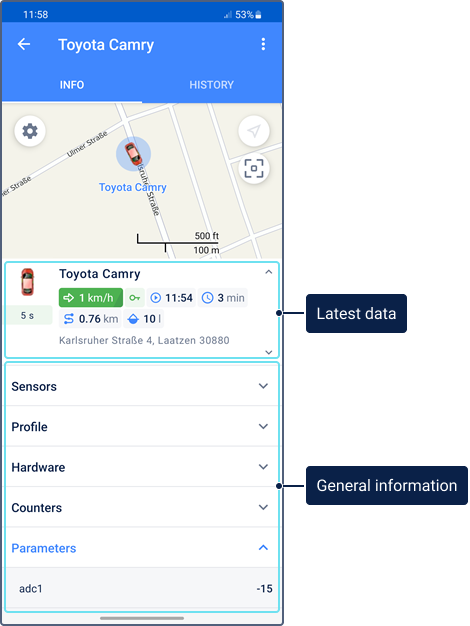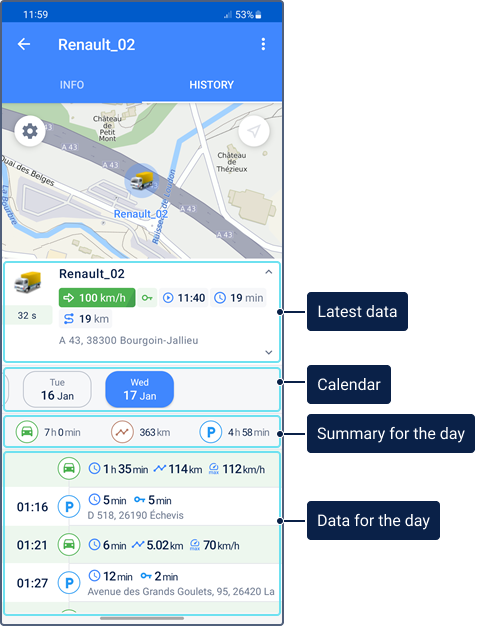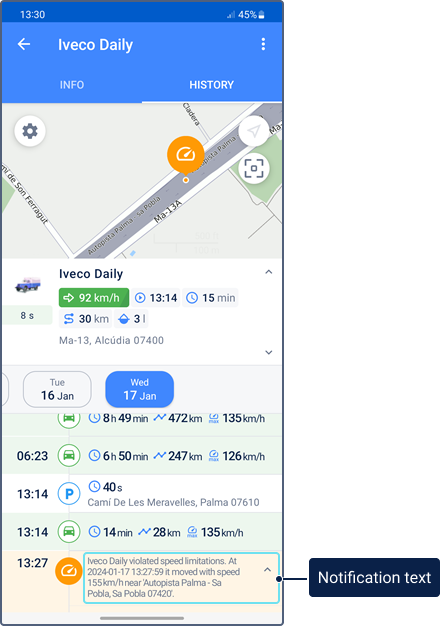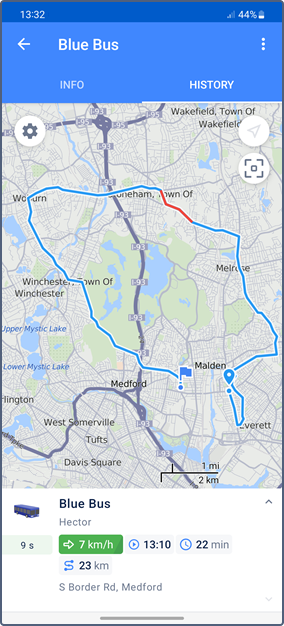To view extended information about a unit, tap the line with it in the list.
The information is shown on two tabs:
The contents of the tabs can be divided into four sections:
- map;
- latest data about the unit;
- general information about the unit (the Info tab);
- data on events registered in the unit history (the History tab).
You can hide the map or the general information/data section. To do this, drag the latest data section up or down respectively. You can also use the arrows on the right side of the latest data section.
In the upper-right corner of the screen, there is the icon . Tap it to open the additional menu with the options.
Info
To view the unit properties the following access rights are required:
- View custom fields;
- View admin fields;
- View drivers;
- View trailers.
The Info tab displays the unit location on the map (taken from the last message), the latest data (see Unit section for its description), and general information about the unit properties.
The General information section consists of tabs with unit properties. To select the tabs you want to be displayed in the section, click Configure tab view at the end of the list and enable or disable the required tabs using the switch. The indicated settings are applied to all the units at the same time.
The following tabs can be available:
| Tab | Description |
|---|---|
| Custom fields | The custom fields added on the same-name tab in the web version of Wialon. |
| Sensors | The sensors for which the Visible option is enabled on the Sensors tab in the web version of Wialon. The order of sensors depends on their order configured on the tab. If filtration is configured for a fuel level sensor, the unit information shows its filtered value. The unit section, by contrast, displays the raw value. |
| Profile | The unit characteristics specified on the Profile tab in the web version of Wialon. |
| Hardware | The device type and unique ID specified on the General tab in the web version of Wialon. To see this information, you must have the View connectivity settings access right to the unit. |
| Counters | The readings of the mileage, engine hours, and GPRS traffic counters. |
| Parameters | The raw data received from the device. To view parameters in the mobile application, the Messages service is required. |
| Trailers | The trailers assigned to the unit. |
| Drivers | The drivers assigned to the unit. To the right of the driver’s name you can see the phone number specified in the driver’s properties. To call the driver, tap the number. |
| Altitude | The altitude above sea level. |
| Satellites | The number of satellites with which the connection is established. |
You cannot edit unit properties in the application. After a long tap on the line with the property, its value is copied to the clipboard.
History
The application uses the data obtained as a result of the real-time processing of messages.
The History tab displays a list which contains data on trips, parking intervals, fuel fillings, drains, and consumption. In addition, the tab can display all events registered by means of notifications with the Register event for unit action. To do this, activate the Events from notifications in unit history switch in the Notifications section of the settings. You can create and configure such notifications only in the web version of Wialon (see more about the types).
The history shows data for the last 300 days.
When detecting trips, the Wialon application uses the trip detection settings.
The data on the tab is presented in chronological order and is formed on the basis of the messages received in the last 24 hours. The data is not formed on the basis of the messages generated more than 24 hours ago (after they are unloaded from the black box).
Day selection
By default, the data is displayed for the current day. You can get the data for another day in one of the ways described below.
- Select the required day in the calendar.
- Swipe down or up to add the previous or next day to the list. If necessary, repeat the action to add more days.
Summary information for the day
The top row shows summary information for the day:
- trip duration ();
track length in trips ();
If a trip starts on one day and ends on the next, the total mileage of such a trip is attributed to both the first and second day at the same time.
- parking duration ();
total fuel consumption in trips () if there is a fuel level sensor (see details here);
Fuel is calculated according to those fuel level sensors in the properties of which the Calculate data in reports by sensor option is enabled in the web version of Wialon. If the option is enabled in the properties of several sensors, their readings are summed up.
If a trip starts on one day and ends on the next, all the fuel consumed during such a trip is attributed to both the first and second day at the same time.
- average fuel consumption per 100 km or mi in trips () if there is a fuel level sensor.
Detailed data for the day
For each day, the summary of the trip duration, track length, and the total parking time is shown above the list.
Below is the information displayed for each type of data. To see the place that corresponds to them on the map, tap the required line in the list. The icon in the selected line is displayed in a contrasting colour (for example, the icon of a fuel filling changes from to ).
| Icon | Type of data | Available information |
|---|---|---|
| Trip |
The amount of fuel consumed during the trip is determined by the fuel level sensor (FLS). If there are several sensors, the sum of their values is displayed. The amount of fuel in the application may differ slightly from the resulting data in the reports executed in the web version of Wialon. This can be caused by the following reasons:
When you tap a trip row, its track is displayed on the map. | |
| Parking |
| |
| Ignition |
This information is displayed if the unit has had the ignition on according to the sensor, but no trip has been detected. The information about ignition is available if the unit has an ignition sensor. To determine the time intervals during which the ignition sensor was on or off, the system takes into account the values of the Maximum interval between messages option in the unit properties and the Timeout option in the ignition sensor properties. The smaller of the two values is used. Learn how sensor operation intervals are determined in the Timeout option description. | |
| Fuel filling |
| |
| Fuel drain |
If fillings and drains are marked as false in the monitoring system, they are excluded from the history. |
Registered events
To indicate events registered by means of notifications with the Register event for unit action, the following icons are used:
| Icon | Event |
|---|---|
| Speed | |
| Alarm (SOS) | |
| Parameter in a message | |
| Connection loss | |
| SMS | |
| Address | |
| Fuel filling | |
| Route progress | |
| Trailer | |
| Passenger alarm | |
| Geofence | |
| Digital input | |
| Sensor value | |
| Idling | |
| Interposition of units | |
| Excess of messages | |
| Fuel drain | |
| Driver | |
| Passenger activity | |
| Maintenance |
To see an event on the map, tap the required line in the list. The icon in the selected line is displayed in a contrasting colour (for example, the icon of the event for the Speed notification type changes from to ). If the event is registered by means of a notification, the event information displays the notification text.
The icons and are used to indicate the beginning and end of the trip, respectively. The segments of the track where speeding was detected are coloured in red.





